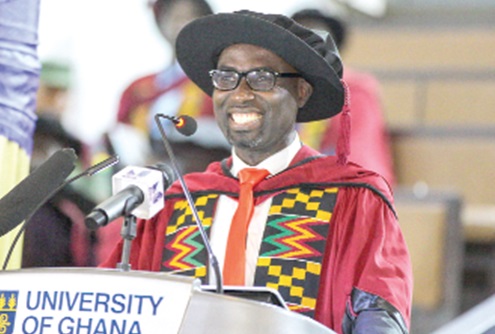
Health Professor advocates establishment of breast milk bank
The Head of Department of the Population, Family and Reproductive Health at the University of Ghana (UG), Professor Richmond Nii Okai Aryeetey, has advocated the establishment of breast milk banks across all health facilities to limit the use of commercial infant formula.
He indicated that human milk provided a bioactive matrix of benefits that could not be replicated by any other source of nutrition. “Having the ability to enhance infant nutrition and reduce childhood morbidity and mortality, a milk bank is the safest alternative to a mother’s own milk,” he said.
Prof. Aryeetey was delivering his inaugural lecture at the University of Ghana on the topic: “Child Feeding for Human Health and Development: Bridging the Know-Do Gap,” last Thursday.
“While formula feeding has its place as an alternative to human breast milk in situations where there is no access to human milk, it must not be marketed as the norm for child feeding. A major problem is created when formula feeding is supplanted as the norm for feeding children,” he said.
Baby formula
He said while cow milk was the main ingredient used in commercial baby formula, it had 300 per cent of the protein that was contained in human milk and, therefore, not designed for human consumption.

The professor expressed worry that in recent years, manufacturers and marketers of baby formulas were going all lengths to persuade mothers to abandon babies’ tailor-made milk for cow milk.
Touching on some benefits of breastfeeding, he said, children who were breastfed had a lower risk of falling behind on their growth and had a significantly reduced risk of dying prematurely from disease compared to those who did not breastfeed.
In addition, he said, breastfeeding also physiologically programmed children to have a healthier eating behaviour while reducing the risk of allergic disorders. Prof. Aryeetey said in health facilities where mothers were not able to produce milk, the facility should be able to provide alternatives apart from formula.
He said the state must significantly scale up support for mothers and families to enhance their ability to feed their children optimally. Although people had choices regarding how they wanted to feed their children, he said, that choice must be informed by the best available evidence.
He noted that the country had made significant gains regarding breastfeeding over the years but there was still much to be done.
“In my interactions with officers from the various health institutions and agencies, there’s strong interest to do better for the children. I believe that the implementation of the science researches that we have been doing over the years can help bridge the gap,” he stated.
Maternity protection
He said there was also the need to walk the talk regarding maternity protection. The state, he said, must create working environments that enabled women to be successful both in their reproductive aspirations as well as in their productive careers.
Prof. Aryeetey added that in the current situation where only nine per cent of women were entitled to paid maternity leave, women were compelled to make a choice between pursuing a career and caring for their babies.
He, therefore, urged successive governments to prioritise extending the 12-week maternity leave to four months. He also urged companies and institutions to create breastfeeding-friendly workplaces that would allow mothers to comfortably feed their babies during working hours.
